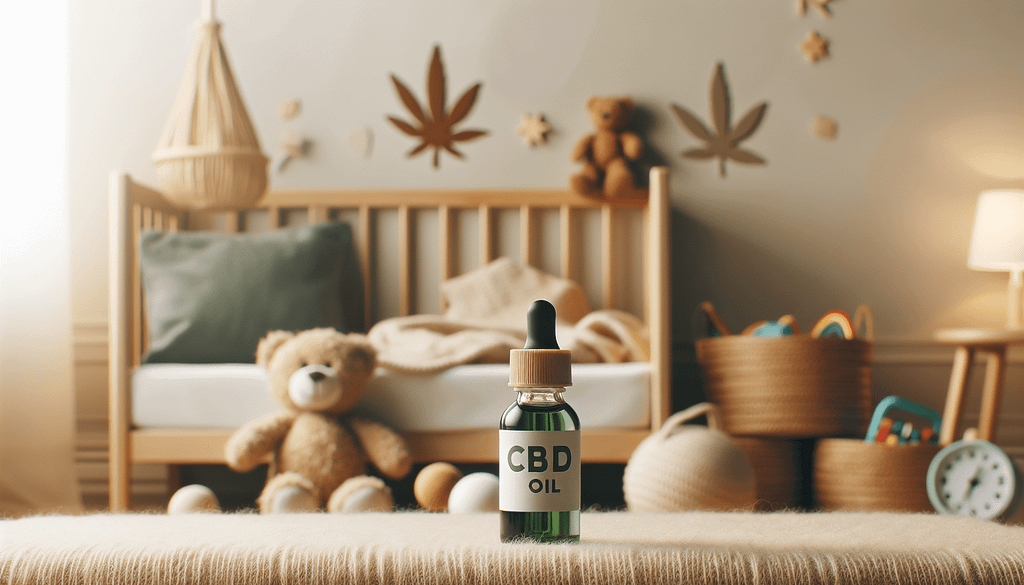As an Amazon Associate I earn from qualifying purchases.
Discover the potential benefits and side effects of using CBD to manage ADHD in kids. Learn how it could reduce hyperactivity and improve focus while considering its risks.
CBD for ADHD in Kids: Benefits and Side Effects
Understanding the complexities of Attention Deficit Hyperactivity Disorder (ADHD) can be overwhelming, especially when it’s affecting your child. As a parent, seeking effective treatment options is a natural response to ensure the best quality of life for your little one. Among the myriad of treatments available, the use of CBD oil has emerged as a topic of interest. This article will dive deep into the benefits and side effects of using CBD for ADHD in kids.
What is ADHD?
ADHD, or Attention Deficit Hyperactivity Disorder, is a neurodevelopmental disorder commonly diagnosed in childhood. Symptoms often include inattentiveness, hyperactivity, and impulsiveness. These traits can impact many areas of a child’s life, from school performance to social interactions. While conventional treatments include behavioral therapy and medication, the search for alternative solutions continues.
What is CBD?
CBD, short for cannabidiol, is a natural compound found in the cannabis plant. Unlike THC (tetrahydrocannabinol), another compound of cannabis, CBD does not have psychoactive effects. This means it doesn’t produce the “high” associated with cannabis use. Instead, CBD is celebrated for its potential therapeutic benefits, making it a topic of growing interest in medical and wellness communities.
The Mechanism of CBD
Interaction with the Endocannabinoid System
CBD interacts with the body’s endocannabinoid system (ECS), a complex cell-signaling system responsible for regulating various physiological and cognitive processes. This system, which includes endocannabinoids, receptors, and enzymes, plays a crucial role in mood, memory, and stress response regulation. By working with the ECS, CBD may help in promoting a balanced state, which could be beneficial for managing ADHD symptoms.
Neuroprotective Properties
Studies have suggested that CBD possesses neuroprotective properties. This means it can protect brain cells from damage and engage in neuroplasticity. For children with ADHD, this could translate to improved brain function and a reduction in symptoms.

Benefits of CBD for ADHD in Kids
Reducing Hyperactivity
One of the most challenging aspects of ADHD is hyperactivity. Parents may notice their child seems to have endless energy, making it difficult for them to focus on tasks or remain seated. Preliminary studies suggest that CBD might help in reducing hyperactivity levels by promoting a sense of calm and relaxation.
Improving Focus
Concentration can be a significant issue for children with ADHD. The continuous struggle to stay focused can impact their academic performance and general ability to perform daily tasks. Some research indicates that CBD may enhance focus and cognitive function by affecting specific receptors in the brain that regulate attention.
Anxiety Relief
Many children with ADHD also experience anxiety, exacerbating their condition. CBD is widely recognized for its anxiety-reducing properties. By reducing anxiety, CBD may indirectly help alleviate ADHD symptoms, providing a two-fold benefit.
Enhancing Sleep Quality
Poor sleep quality is a common issue among children with ADHD. Inadequate sleep can worsen ADHD symptoms and create a vicious cycle. CBD has been found to improve sleep quality, promoting better rest and subsequently reducing the severity of ADHD symptoms.
Side Effects of CBD in Kids
Common Side Effects
While CBD is generally considered safe, it can have side effects, especially when administered to children. Common side effects include:
- Fatigue
- Diarrhea
- Changes in appetite
- Dry mouth
These side effects, while generally mild, should be monitored to ensure that they don’t outweigh the potential benefits.
Possible Interactions with Medication
CBD can interact with other medications, which is particularly important to consider if your child is already on prescribed medications for ADHD or other conditions. It’s crucial to consult a healthcare provider before introducing CBD into your child’s treatment regimen to avoid any adverse interactions.
Long-term Effects
The long-term effects of CBD, particularly in children, are not yet well understood. As research is continually evolving, the medical community remains cautiously optimistic about the potential benefits but also emphasizes the need for long-term studies.
Legal Aspects of CBD
Legality in Your Area
The legality of CBD varies from place to place. In some areas, it’s entirely legal, while in others, it may fall into a gray area or be outright prohibited. Before deciding to use CBD, check the local regulations to avoid any legal complications.
Quality Control
The quality of CBD products can vary significantly. When choosing a CBD product for your child, it’s essential to ensure it comes from a reputable source. Look for products that have been third-party tested for quality and potency. This minimizes the risk of contaminants and ensures you’re providing the highest quality product to your child.

How to Administer CBD to Children
Dosage Guidelines
Determining the correct dosage of CBD for children can be challenging. As CBD affects everyone differently, there is no one-size-fits-all guideline. However, starting with a low dose and slowly increasing it while monitoring your child’s response is a common approach. Consult with a healthcare provider to determine the best starting dosage for your child.
Forms of CBD
CBD comes in various forms, each with its pros and cons. Options include:
- Oils and tinctures: Easy to dose but may have an unpleasant taste.
- Edibles: More palatable but can be difficult to dose accurately.
- Capsules: Convenient but may be challenging for children to swallow.
- Topicals: Applied directly to the skin but generally ineffective for ADHD.
Monitoring and Adjusting
Once your child begins using CBD, closely monitor for any changes in symptoms or side effects. Keep a journal to track their progress and make any necessary adjustments in consultation with your healthcare provider.
Scientific Studies and Research
Existing Studies
Numerous studies have examined the potential benefits of CBD for various conditions, but research specifically focusing on ADHD, particularly in children, is still limited. Early findings are promising, but more robust, large-scale studies are needed to draw definitive conclusions.
Ongoing Research
Ongoing research aims to better understand how CBD affects ADHD and other neurodevelopmental disorders. Keeping an eye on the latest studies can provide new insights and more concrete evidence regarding the efficacy and safety of CBD for children with ADHD.
Parental Experiences and Anecdotal Evidence
Positive Experiences
Many parents have reported positive outcomes after introducing CBD to their child’s treatment plan. Stories often highlight improvements in focus, a decrease in hyperactivity, and better sleep quality. These anecdotal reports can be encouraging, but it’s important to remember that individual responses to CBD can vary.
Negative Experiences
On the flip side, some parents have noted minimal improvements or adverse side effects. These experiences underline the necessity of a cautious, well-informed approach when considering CBD for your child.
Expert Opinions
Medical Community
The medical community remains divided on the use of CBD for ADHD, especially in children. Some healthcare providers are more open to alternative treatments like CBD, while others advocate for sticking with more established, conventional approaches until more research is available.
Holistic Practitioners
Holistic health practitioners often embrace CBD as a potential tool for managing ADHD symptoms. They emphasize a comprehensive approach that includes CBD as part of a broader treatment plan focused on lifestyle changes, nutrition, and other natural remedies.
Alternatives to CBD
Behavioral Therapy
Behavioral therapy is a cornerstone of ADHD treatment. It focuses on modifying negative behaviors and reinforcing positive ones, providing a structured approach that can be very effective.
Dietary Adjustments
Some studies suggest that dietary changes can impact ADHD symptoms. Reducing sugar intake, eating a balanced diet rich in omega-3 fatty acids, and eliminating potential allergens are strategies that some parents find helpful.
Other Natural Remedies
Other natural remedies, such as acupuncture, yoga, and herbal supplements, may offer additional avenues for managing ADHD symptoms. These should be explored in consultation with a healthcare provider to ensure they’re safe and appropriate for your child.
Making an Informed Decision
Weighing the Pros and Cons
Deciding whether to use CBD for your child is a significant decision that requires careful consideration of the potential benefits and risks. Weighing the evidence, consulting medical professionals, and considering your child’s unique needs and circumstances are essential steps in this process.
Consultation with Healthcare Providers
Always consult with your child’s healthcare provider before starting any new treatment, including CBD. They can offer valuable insights, help you monitor progress, and ensure that the treatment plan is safe and effective.
Conclusion
The use of CBD for ADHD in kids holds promise but is still a developing field with many unanswered questions. The potential benefits of reduced hyperactivity, improved focus, and better sleep may make it an attractive option for some parents. However, it’s crucial to proceed with caution, keep abreast of the latest research, and work closely with healthcare providers to ensure the best outcomes for your child.
If you found this article helpful, please clap, leave a comment, and subscribe to our Medium newsletter for updates on similar topics. Your support and feedback are greatly appreciated!
Disclosure: This story incorporates AI assistance for content creation.
Disclosure: As an Amazon Associate, I earn from qualifying purchases.
Amazon and the Amazon logo are trademarks of Amazon.com, Inc, or its affiliates.
